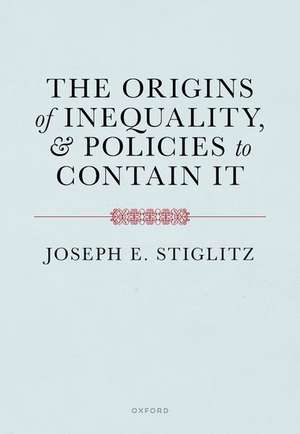The Origins of Inequality
Autor Joseph Stiglitzen Limba Engleză Paperback – 27 mar 2025
Preț: 267.36 lei
Preț vechi: 316.85 lei
-16% Nou
Puncte Express: 401
Preț estimativ în valută:
51.17€ • 55.56$ • 42.98£
51.17€ • 55.56$ • 42.98£
Carte nepublicată încă
Doresc să fiu notificat când acest titlu va fi disponibil:
Se trimite...
Preluare comenzi: 021 569.72.76
Specificații
ISBN-13: 9780198799597
ISBN-10: 0198799594
Pagini: 880
Dimensiuni: 171 x 246 mm
Editura: OUP OXFORD
Colecția OUP Oxford
Locul publicării:Oxford, United Kingdom
ISBN-10: 0198799594
Pagini: 880
Dimensiuni: 171 x 246 mm
Editura: OUP OXFORD
Colecția OUP Oxford
Locul publicării:Oxford, United Kingdom
Notă biografică
Joseph E. Stiglitz is an American economist and a professor at Columbia University. He is also the co-chair of the High-Level Expert Group on the Measurement of Economic Performance and Social Progress at the OECD, and the Chief Economist of the Roosevelt Institute. A recipient of the Nobel Memorial Prize in Economic Sciences (2001) and the John Bates Clark Medal (1979), he is a former senior vice president and chief economist of the World Bank and a former member and chairman of the (US president's) Council of Economic Advisers. In 2000, Stiglitz founded the Initiative for Policy Dialogue, a think tank on international development based at Columbia University. He has been a member of the Columbia faculty since 2001 and received that university's highest academic rank (university professor) in 2003.
